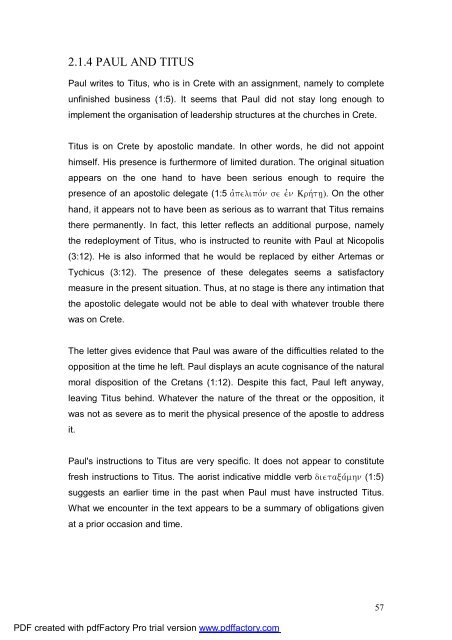A Text centred rhetorical analysis of Paul's Letter to Titus
A Text centred rhetorical analysis of Paul's Letter to Titus
A Text centred rhetorical analysis of Paul's Letter to Titus
Create successful ePaper yourself
Turn your PDF publications into a flip-book with our unique Google optimized e-Paper software.
2.1.4 PAUL AND TITUS<br />
Paul writes <strong>to</strong> <strong>Titus</strong>, who is in Crete with an assignment, namely <strong>to</strong> complete<br />
unfinished business (1:5). It seems that Paul did not stay long enough <strong>to</strong><br />
implement the organisation <strong>of</strong> leadership structures at the churches in Crete.<br />
<strong>Titus</strong> is on Crete by apos<strong>to</strong>lic mandate. In other words, he did not appoint<br />
himself. His presence is furthermore <strong>of</strong> limited duration. The original situation<br />
appears on the one hand <strong>to</strong> have been serious enough <strong>to</strong> require the<br />
presence <strong>of</strong> an apos<strong>to</strong>lic delegate (1:5 ajpelipovn se ejn Krhvth/). On the other<br />
hand, it appears not <strong>to</strong> have been as serious as <strong>to</strong> warrant that <strong>Titus</strong> remains<br />
there permanently. In fact, this letter reflects an additional purpose, namely<br />
the redeployment <strong>of</strong> <strong>Titus</strong>, who is instructed <strong>to</strong> reunite with Paul at Nicopolis<br />
(3:12). He is also informed that he would be replaced by either Artemas or<br />
Tychicus (3:12). The presence <strong>of</strong> these delegates seems a satisfac<strong>to</strong>ry<br />
measure in the present situation. Thus, at no stage is there any intimation that<br />
the apos<strong>to</strong>lic delegate would not be able <strong>to</strong> deal with whatever trouble there<br />
was on Crete.<br />
The letter gives evidence that Paul was aware <strong>of</strong> the difficulties related <strong>to</strong> the<br />
opposition at the time he left. Paul displays an acute cognisance <strong>of</strong> the natural<br />
moral disposition <strong>of</strong> the Cretans (1:12). Despite this fact, Paul left anyway,<br />
leaving <strong>Titus</strong> behind. Whatever the nature <strong>of</strong> the threat or the opposition, it<br />
was not as severe as <strong>to</strong> merit the physical presence <strong>of</strong> the apostle <strong>to</strong> address<br />
it.<br />
<strong>Paul's</strong> instructions <strong>to</strong> <strong>Titus</strong> are very specific. It does not appear <strong>to</strong> constitute<br />
fresh instructions <strong>to</strong> <strong>Titus</strong>. The aorist indicative middle verb dietaxavmhn (1:5)<br />
suggests an earlier time in the past when Paul must have instructed <strong>Titus</strong>.<br />
What we encounter in the text appears <strong>to</strong> be a summary <strong>of</strong> obligations given<br />
at a prior occasion and time.<br />
PDF created with pdfFac<strong>to</strong>ry Pro trial version www.pdffac<strong>to</strong>ry.com<br />
57

















